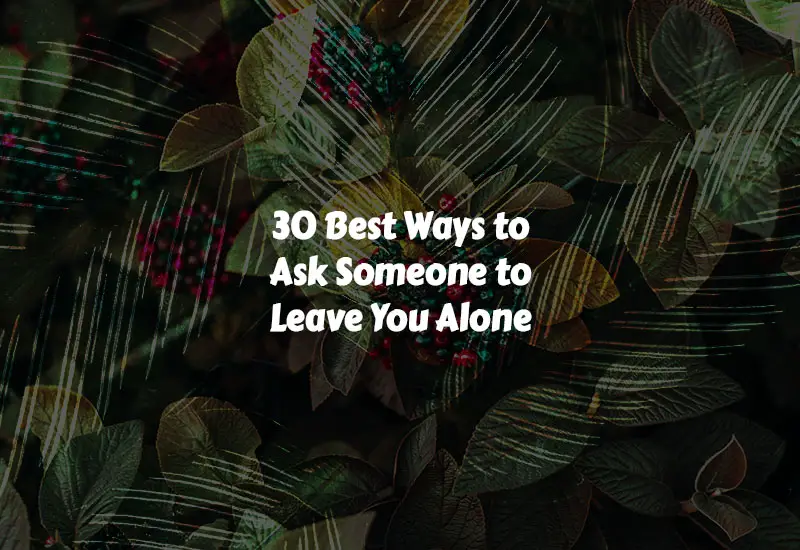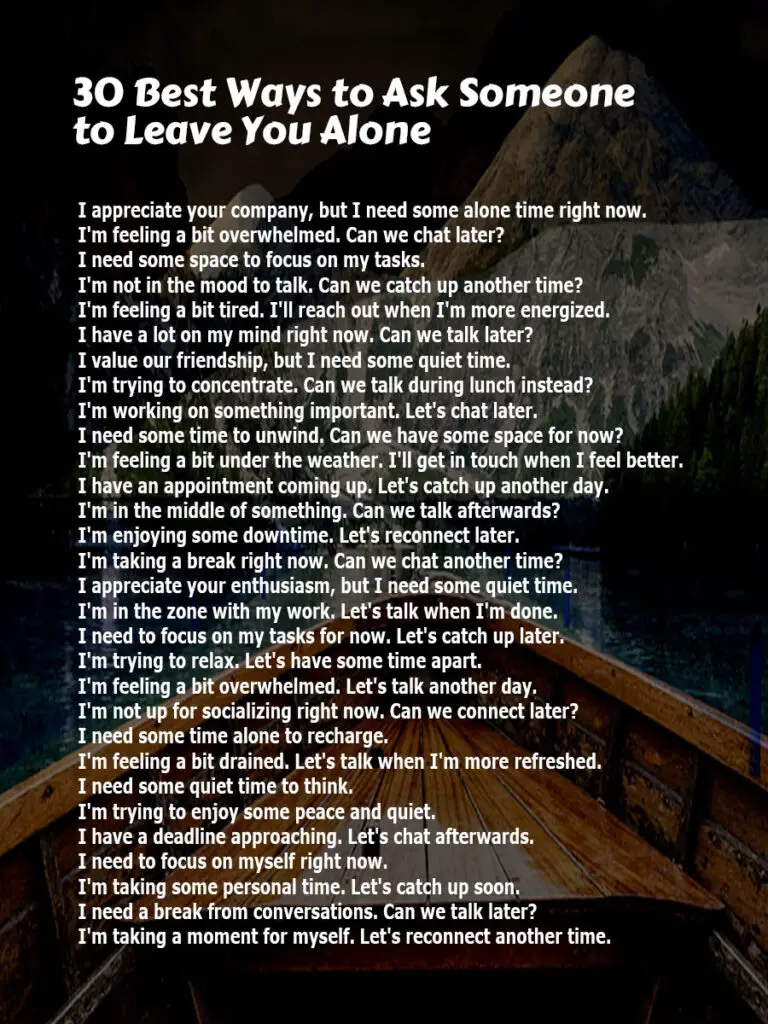Sometimes, we all need a little space and time to ourselves. It’s okay to want to be alone and recharge. But how do you kindly let someone know that you need some alone time? In this article, we’ll explore effective and polite ways to ask someone to leave you alone without hurting their feelings.
Whether it’s a talkative coworker, a persistent friend, or even a well-meaning family member, these strategies can help you set boundaries while maintaining good relationships. Let’s dive into practical ways to communicate your need for personal space respectfully.

Here are 30 Best Ways to Ask Someone to Leave You Alone:
- I appreciate your company, but I need some alone time right now.
- I’m feeling a bit overwhelmed. Can we chat later?
- I need some space to focus on my tasks.
- I’m not in the mood to talk. Can we catch up another time?
- I’m feeling a bit tired. I’ll reach out when I’m more energized.
- I have a lot on my mind right now. Can we talk later?
- I value our friendship, but I need some quiet time.
- I’m trying to concentrate. Can we talk during lunch instead?
- I’m working on something important. Let’s chat later.
- I need some time to unwind. Can we have some space for now?
- I’m feeling a bit under the weather. I’ll get in touch when I feel better.
- I have an appointment coming up. Let’s catch up another day.
- I’m in the middle of something. Can we talk afterwards?
- I’m enjoying some downtime. Let’s reconnect later.
- I’m taking a break right now. Can we chat another time?
- I appreciate your enthusiasm, but I need some quiet time.
- I’m in the zone with my work. Let’s talk when I’m done.
- I need to focus on my tasks for now. Let’s catch up later.
- I’m trying to relax. Let’s have some time apart.
- I’m feeling a bit overwhelmed. Let’s talk another day.
- I’m not up for socializing right now. Can we connect later?
- I need some time alone to recharge.
- I’m feeling a bit drained. Let’s talk when I’m more refreshed.
- I need some quiet time to think.
- I’m trying to enjoy some peace and quiet.
- I have a deadline approaching. Let’s chat afterwards.
- I need to focus on myself right now.
- I’m taking some personal time. Let’s catch up soon.
- I need a break from conversations. Can we talk later?
- I’m taking a moment for myself. Let’s reconnect another time.
See Also: 26 Great Ways to Tell Someone to Stop Singing
Setting Boundaries
Establishing boundaries is crucial when asking someone to leave you alone. By clearly communicating your limits and expectations, you can effectively assert your need for space and respect.
Communicate Clearly
Openly express your feelings and boundaries to the individual in a direct and respectful manner. Avoid beating around the bush to prevent misunderstandings.
Use Assertive Language
Employ assertive language when setting boundaries, such as using “I” statements to convey your needs firmly and confidently. Avoid passive phrases.
Changing Communication Patterns
Changing communication patterns can play a significant role in asking someone to leave you alone. By adjusting how you interact with the individual, you can effectively set boundaries and make your intentions clear.
Limit Interaction
If someone is not respecting your boundaries, it may be time to restrict your interaction with them. Instead of engaging in lengthy conversations, keep your responses brief and to the point.
Consider communicating with them only when absolutely necessary. This approach can help convey your desire for space and discourage prolonged contact.
Avoid Certain Places Or Situations
Identify the places or situations where you consistently encounter the individual you want to avoid. Once identified, make a conscious effort to avoid or minimize your presence in those areas.
- Perhaps refrain from attending events where you know they will be present.
- Modify your routines to reduce the likelihood of running into them.
Seeking Support
If you’re seeking support in asking someone to leave you alone, consider setting clear boundaries and expressing your feelings honestly. Communicate assertively and calmly, emphasizing your need for personal space. Remember, prioritizing your well-being is essential in any relationship or interaction.
Talk To A Trusted Friend Or Family Member
If you’re struggling with someone who won’t leave you alone, seeking support from a trusted friend or family member can make a world of difference. Talking to someone who knows and cares about you can provide comfort, guidance, and practical advice. Share your concerns openly and honestly, explaining the situation and how it’s affecting you.
Let them know that you need their support and ask them to help you brainstorm solutions. Sometimes, just talking it out can provide the clarity and reassurance needed to handle the situation effectively. Remember, you don’t have to face this alone, and reaching out for support is a sign of strength.
Consider Professional Help
If the person who won’t leave you alone is causing you significant distress or if their behavior is escalating, it may be necessary to seek professional help. A mental health counselor or therapist can offer valuable guidance and strategies for dealing with the situation. They can help you develop healthy boundaries, assertiveness skills, and coping mechanisms to navigate this challenging situation.
Additionally, professional help can provide a safe space to explore any underlying emotions or vulnerabilities that may be contributing to the issue at hand. Don’t hesitate to reach out to a professional who specializes in handling these types of situations. Remember, taking care of your emotional well-being is essential and seeking professional help is a proactive step towards finding a resolution.
See Also: 20 Great Ways to Respond to Have You Lost Weight
Self-care Strategies
When dealing with someone who won’t leave you alone, it’s crucial to prioritize self-care. These strategies will help you find strength, peace, and resilience in challenging times.
Practice Self-compassion
Self-compassion is key to maintaining your emotional well-being. Be gentle with yourself and understand that it’s okay to feel overwhelmed or frustrated. Treat yourself with kindness, just as you would a close friend.
Suggestions:
- Remind yourself that everyone deserves respect and boundaries, including you.
- Speak to yourself kindly and replace negative self-talk with positive affirmations.
- Take breaks when you need them and allow yourself to rest and recharge.
- Engage in activities that bring you joy and nourish your soul.
- Reach out to supportive friends or family members for encouragement and reassurance.
Engage In Stress-relieving Activities
Escaping the overwhelming pressures of a persistent individual can be achieved by embracing stress-relieving activities. These activities will help you relax and regain your inner peace.
Here are some ideas:
- Practice deep breathing exercises to calm your mind and body.
- Take regular breaks to stretch and do quick exercises.
- Go for walks or engage in physical activities that you enjoy.
- Listen to calming music or meditate to find inner tranquility.
- Engage in hobbies or creative activities that distract your mind and bring you happiness.
Remember, your emotional well-being matters. Implementing self-care strategies can empower you to handle intrusive individuals assertively and safeguard your peace of mind.
Legal Options
When you find yourself in a situation where someone is unwilling to respect your boundaries or continuously intrudes on your personal space, you must be aware of the legal options available to address the issue. It’s essential to understand your rights and take appropriate steps to protect yourself. Here are the key aspects to consider:
Know Your Rights
It’s crucial to be aware of your legal rights when dealing with unwelcome attention or harassment. Familiarize yourself with the laws in your jurisdiction pertaining to personal boundaries and harassment. Understanding your rights will empower you to take the necessary steps to address the situation.
Document Incidents
Documenting every incident of unwanted behavior is a vital aspect of establishing a case. Make detailed notes of the date, time, location, and nature of each occurrence. If the individual is sending harassing messages, save copies with timestamps. This documentation will serve as valuable evidence should legal action become necessary.

Conclusion
Dealing with people who don’t respect your boundaries can be challenging. It’s important to approach the situation calmly and assertively. By using clear communication and setting firm boundaries, you can ask someone to leave you alone in a respectful manner.
Remember to prioritize your well-being and manage your interactions with others effectively.









